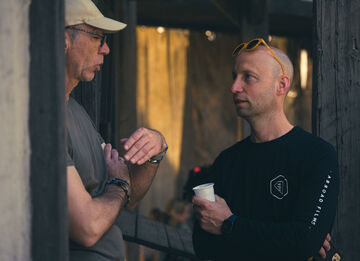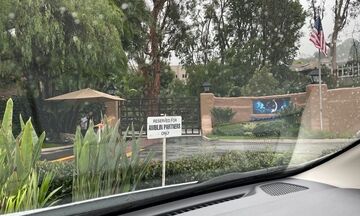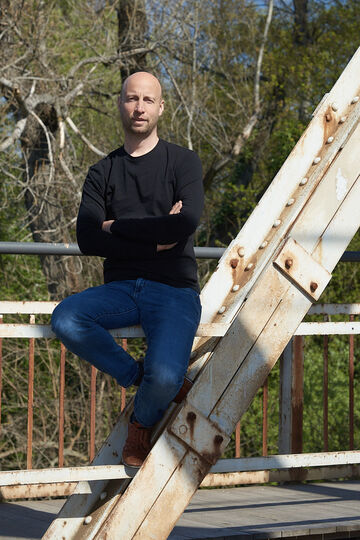Meet Your Makers: Attila Horvath on Sentimental Views of Filmmaking - LBB interview
Abroad Films owner and filmmaker on observing filmmaking from creative and production sides, trust in the industry and opening up in the US market
Jun 16, 2023
In conversation with Attila Horváth - owner of the production service company Abroad Films and seasoned agency filmmaker. We will gain insight now into the challenges and rewards of servicing productions, the importance of trust in the industry, and the personal journey that led to starting out in a new industry in his forties. With over twenty years of experience, Attila shares his lessons learned along the way and discusses his company's expansion into the US market, as well as his passions outside of film production (spoiler alert: it has to do with Arsenal).
LBB> What first attracted you to production - and has it been an industry you’ve always worked on, or did you come to it from another area?
Attila>
I come from an agency background and have always loved filmmaking and
creating films. When I moved to London, I became more and more involved
in service production, which led to creating my own service company.
LBB> What was your first role in the production world, and how did this experience influence how you think about production and how you grew your career?
Attila> My first role in the production world was in my twenties, working on a Panasonic commercial for the Sydney Olympics in 1999 (prior to this, I had worked on various corporate film projects). The experience taught me the importance of thoroughly understanding the rights and permissions surrounding the footage and talent involved in a project. In this particular instance, we used footage of retired athletes and one of the subjects turned out to be the daughter of an Armenian weightlifter who was living in Budapest as a fifty-something year old lawyer. What are the chances? Although we had purchased the rights to use the footage, we had not secured the rights to use the likeness of the athlete for advertising purposes, so we were unable to use the footage in the final commercial. This was an early and expensive mistake. Fortunately, I was able to resolve it amicably with the client.
After this experience, I founded my own agency and worked as a creative director therefore I collaborated with production companies and directors closely quite often. At that time, there was no internal agency producer role, so I worked with freelance producers and line producers. As an owner, I was always aware of the financial aspects of the projects as well. I continued in this capacity for several years (on projects such as T-Mobile, ALDI, OLX, and FHB - a Hungarian bank) before transitioning into creating an internal production team.
After moving to London, I was able to expand my internal agency production capabilities and created Abroad Films as a service company, which allowed me to bring in work from the British market. This led to the growth and independence of my own company and, eventually, working on international service projects first in Hungary and then later in Bulgaria. With so many years of experience, we have an excellent network of professionals in both countries.

LBB> How did you learn to be a producer?
Attila> As a creative director and agency owner, I observed filmmaking from both the creative and production side for 15-20 years without any personal stakes before starting to run my own service company. I learned that each production presents new challenges and areas for growth. I consider my own production company to be the culmination of my journey, but servicing is slightly different from producing. Initially, I struggled to find my footing in service production, but eventually, I found my place.
I was fortunate enough to learn from many people (producers, our amazing Abroad Films line producers and clients) in the past 20 years, and I credit my experience with these people for creating Abroad Films. This is why the transition into servicing was smooth.
The decision to start Abroad Films was not conscious, but the desire to create a new business was natural. Filmmaking was the best part of my work in agencies, and I had many filmmaker friends, including directors, producers, and cinematographers. It was natural for me to start making films within the agency, which led to the creation of Abroad Films and my own service company.
In my late 40s, I found myself in a new environment with new partners and networks. I wanted to keep working and did not want to retire in Hungary at the age of 45. I still have 10-20 active years left in my career. I am pleased to be succeeding on the international stage and am receiving more work from various countries. In January, we opened up to the US market, which has been successful, and I continue to receive requests from there.

Visiting Amblin in LA, Steven Spielberg’s production company
LBB> Looking back to the beginning of your career, can you tell us about a production you were involved in where you really had to dig deep, which helped you grow as a producer?
Attila> In 2005 we took an important step forward with our agency. In the beginning, from the late 90s, we worked only with Hungarian directors at the agency. In 2005 T-Mobile was one of our clients, and there was a demand from their side to work with foreign directors. The Scandinavian visual world was the perfect fit for their brand image at the time, so we started looking for Scandinavian directors. This was a huge leap and a learning experience since the work methods and views differed. We were fascinated by how two people could see the same thing in such different ways.
During casting, I would have chosen a particular person for a role, but the Swedish director chose completely different people for different reasons. I asked them why they made that choice - I was curious about their reasons and perspective. It was amazing to bring an international flavour and mood into the production.
We shot 7-8 films with Swedish director Daniel Börjesson. Once there was a scene with a taxi passing in front of two buildings. Next to the classic downtown building, there was an ugly, socialist-style concrete and glass building on that street. Daniel chose the glass building as the background for the shot while I was thinking of the classic, neo-baroque building.
Working with directors and DoPs was a crucial milestone for me. It was my first contact with foreign filmmakers, followed by some international productions in Slovakia, Croatia, and then South Africa. We learned a lot from the international top-level film world's way of thinking, and it opened up space and perspective for me.
Today, I’m still in contact with the directors I worked with (from Denmark, Spain, and Sweden), and our experiences with them continue to shape our work. If the budget allows it, we strive to involve foreign directors in the production, making the project as international as possible.

LBB> A good producer should be able to produce for any medium, from film to events to digital experience. Do you agree or disagree with this statement? Why/why not?
Attila> This does not speak of a producer's capabilities. Films, events, digital - these are separate worlds, separate categories. Making a movie for a few thousand pounds or hundreds of thousands or millions is a different thing, a different network and, of course, different resources. The crews are different as well.
In today's world, it is important to strive to provide a wide range of services - from online content, music videos, and big commercials to TV series or feature films. A service company is prepared for this, with the necessary resources available.
LBB> What’s your favourite thing about production and why?
Attila> I have a sentimental view of the filmmaking process. I believe the best part of filmmaking is the execution when the plan on paper starts to come to life.
During the pre-production stage, the team starts working on the logistics of the shoot, including casting actors and finding locations. Once everything is in place, the team can start shooting. This is the best part: the atmosphere, the mood on set.
LBB> How has production changed since you started your career?
Attila>
Production itself hasn't changed that much. But the industry has seen a
rise in demand for low-budget online content. My other company, Flab House,
is a content hub, bringing together agency and film resources to create
visually impactful content. They have a content creation unit, small
studios, teams, and crew members available. The company includes an
advertising agency section that deals with creative work, while the film
production side is called Abroad Films. Flab House is responding to the
trend of creating spectacular, visually impactful content from
fragments by bringing together agency and film resources.
LBB> And what has stayed the same?
Attila> As filmmakers, we strive to work our magic and create something unique. Quick responses and creative solutions are essential in our line of work. This has always been the same.
For instance, once we faced a challenge while filming a Panasonic commercial at a lake near Budapest. Our actor was in a fishing boat with an oil lamp that had stopped working. But thanks to our prop master, Gabor Szabo, who sprang into action, rushing to the nearby Lamp Museum in Zsámbék, we got a new lamp through the night security guard and brought it to the set. These kinds of situations arise frequently, and it takes resourcefulness, creativity, and a production-minded approach to overcome them.
LBB> What do you think is the key to being an effective producer - and is it innate or something that can be learned?
Attila> Efficiency - it either comes naturally or can be learned.
Resourcefulness - daring to find the simplest way (not only in terms of cost-effectiveness) to get things done. Let's not complicate our lives! It should not be time-consuming or expensive, hence the need for resourcefulness.
Finding a good team of people is crucial. The producer works with other producers and the HoDs. They are the backbone of the production.
The aim is to find the simplest path to the goal, not just for the sake of saving money, but to avoid struggling during the shooting process. It should be as smooth as possible, with a good team and a pleasant atmosphere alongside it.
LBB> Which production project from across your career are you most proud of and why?
Attila> I have had a lot of favourite moments in my career, from the beginning of my work, including my early jobs with Panasonic and being involved in international productions.
I believe that working with foreign directors expands my horizons, and I take pride in building up my company to where it is today. We are increasingly taking on long-form projects like TV shows and feature films in addition to commercials.
LBB> In terms of recent work, which projects have you found particularly exciting or have presented particularly interesting production challenges?
Attila> I find it really exciting to venture into long-form projects, and I am more than eager to do so. Right now, I'm already involved in two projects like that. We are currently filming two TV shows for the British market, with shooting set to take place in May and July. Stay tuned; I will reveal more information about this soon to LBB readers.
I went on a campaign trip to Los Angeles in January, and before that, I was in New York last autumn. Since then, we've been receiving inquiries from there as well.
Aside from our service work, we are also delving into our own co-productions. After our previous UK feature project, "The Witch," which we serviced in Budapest, we are co-producing their next movie, which is scheduled to be filmed in the second half of this year.
LBB> Producers always have the best stories. What’s the hairiest / most insane situation you’ve found yourself in, and how did you work your way out of it?
Attila> One of my most memorable experiences was a shoot in the Slovak Tatras at -20 degrees Celsius. The wind was incredibly strong and so intense that even the ski lifts had to be shut down. We had to rely on the help of local guides to hike up the mountain, carrying our equipment in our hands to different filming locations.
It took us two days to complete the shoot, and after a long day's work, we returned to our accommodation to relax and have a sip of Becherovka.
LBB> What are your personal ambitions or aspirations as a producer?
Attila> I like talking to people, meeting new people, and working in a team, and that's what I do. This is how I meet and find clients that fit well with me. It’s important for me to have both good professional and personal relationships with my team members.
LBB> As a producer, your brain must have a neverending “to-do” list. How do you switch off?
Attila> I love to chill out by watching movies and TV shows; it’s my go-to relaxation method. I also enjoy getting lost in a good book, and keeping active with sports like tennis, working out, and swimming. Cooking is also a passion of mine, and I love to socialise too - whether that's hitting the town and partying, chatting with interesting people, or just hanging out with my closest friends and family.

The Godfather’s desk - The Art of Moviemaking: The Godfather exhibition, The Academy Museum of Motion Pictures
It's a whole mix of things I love doing, depending on my mood and what’s happening. And let's not forget my undying love for Arsenal - being a fan is just a part of who I am!
LBB> Producers are problem solvers. What personally fuels your curiosity and drive?
Attila> My drive is pretty specific and unique because I spent my previous life as an agency owner and creative director, so the film industry is a somewhat new area for me.
It's been around 5-6 years since I've started focusing on this, and the thrill of the novelty gives me the extra push. I'm still in the process of building something up, and it's exciting to see everything unfold before my eyes.
I enjoy the challenge of creating something new. Now, things are starting to take off, and there's a lot of growth happening, particularly in the US market and with long-form productions and our own projects.

Universal Studios, LA
LBB> What advice would you give to people interested in becoming a producer?
Attila> As a young producer, I don't feel entitled to give advice.
LBB> From your experience, what are the ingredients for a successful production?
Attila> To me, filmmaking is all about the people. The team you work with is crucial, and it's important to have confidence in the relationships you build and the quality of the professionals you collaborate with - whether you're in the UK, the US, Hungary or Bulgaria. That's why I take great care in selecting the Abroad Films team and knowing exactly who I want to work with.
LBB> What’s the key to a successful production-client relationship?
Attila> Our primary clients are production companies, who we work with closely to deliver top-quality results. We need to showcase our team and what we can bring to the table to win them over. It's not just about being convincing. It’s also about building trust from the get-go.
Outsourcing parts of the production to a foreign country is a big decision for a producer. That's why we put in the effort to make them feel at ease and let them know they are in good hands.
Although it's a financial decision at the outset, the human element counts, trust is everything when it comes to working with service companies, and we understand that - we are the new kids on the block.